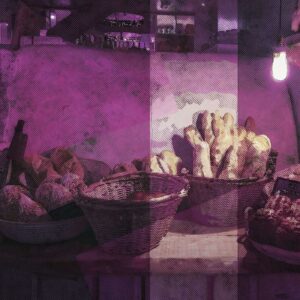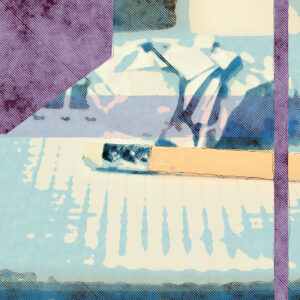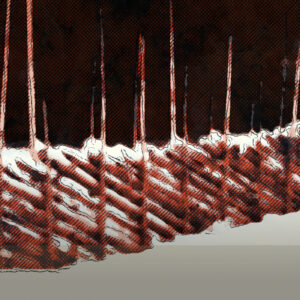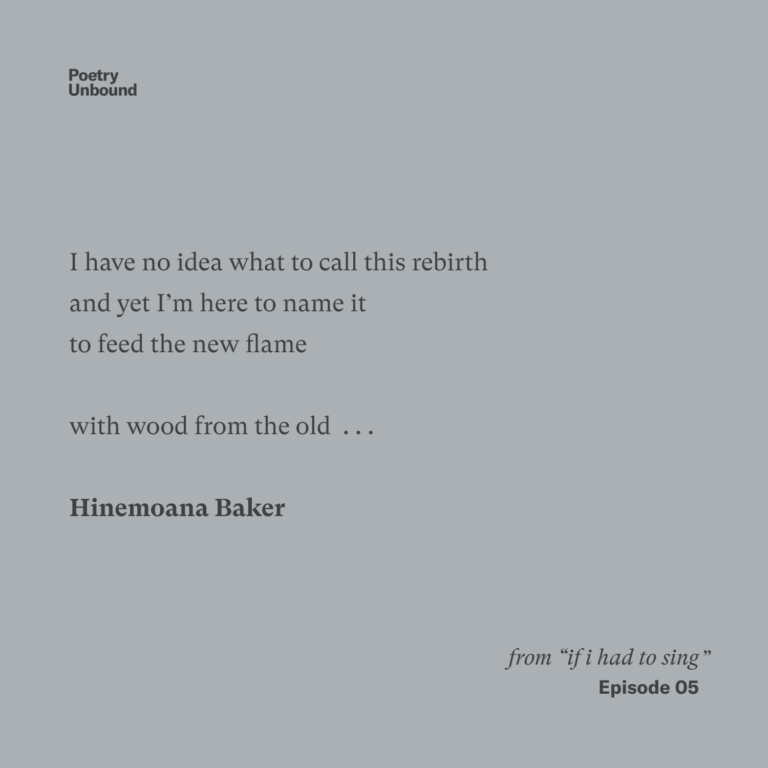Carolina Ebeid
Reading Celan in a Subway Station
The sounds of a city can be overwhelming — but in the imagination of this poem, they are made into something new.
We’re pleased to offer Carolina Ebeid’s poem, and invite you to connect with Poetry Unbound throughout this season.
Pre-order the forthcoming book Poetry Unbound: 50 Poems to Open Your World and join us in our new conversational space on Substack.
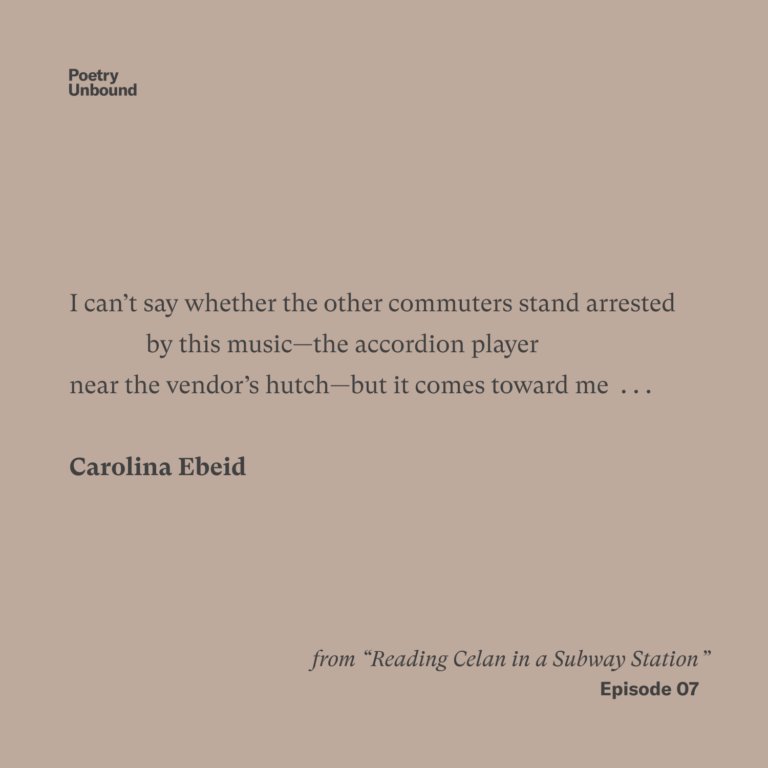
Guest
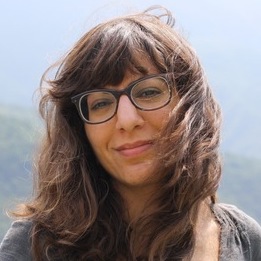
Carolina Ebeid is a multimedia poet. Her first book, You Ask Me to Talk About the Interior, was published by Noemi Press as part of the Akrilica Series, and selected as one of ten best debuts of 2016 by Poets & Writers. Her work has been supported by the Stadler Center for Poetry at Bucknell University, Bread Loaf, CantoMundo, as well as a residency fellowship from the Lannan Foundation. Ebeid currently edits poetry at The Rumpus and the multimedia zine Visible Binary.
Transcript
Pádraig Ó Tuama: My name is Pádraig Ó Tuama, and once, I was on the underground train in London. And in the underground in London people don’t talk at all, really. And somebody in the middle of this carriage was sitting and was crying. And it was obvious, but there was a kind of a respect and an awkwardness in trying not to draw too much attention to it. Eventually, one person next to the person who was crying put a Kleenex on her knee. And that was taken with gratitude. Everything was done in silence. And then the person on the other side offered a peppermint. And somehow, the humor of it all and the tenderness and the languagelessness of everything combined to make that a moment that I’ve never forgotten.
[music: “Praise the Rain” by Gautam Srikishan]
“Reading Celan in a Subway Station” by Carolina Ebeid:
“I can’t say whether the other commuters stand arrested
by this music—the accordion player
near the vendor’s hutch—but it comes toward me, world-
sorrow drafting through the hyaline
shell of myself in thought. Reconstruction delays,
the stench of piss & nothing
weather shaped, nothing ocean spun. Steam hammers
& dynamite tunneled out
a labyrinth, this inner ear where eros doesn’t linger.
Unbeautiful in its volts & watt-hours,
its generations of mice. The wall is dinged & saccharine-
glazed where he plays in a suit.
I follow his fingers’ minuscule work over a column of keys,
drawing out & in the melody
“of that pleated lung. It lifts away from us climbing the stairs
past horse patrols & jewelry hawks,
past scaffolding & saplings blown like tonophants,
past fruit stands, placards & idle
Greyhounds, the corridors of silver buildings, the thunder
with silver veins—it lifts away
because it seeks the high, lone sun. Admit his music,
Cause-Of-All, it is handmade.”
[music: “Every Place We’ve Been” by Gautam Srikishan]
This poem is an amazing gathering-together of the experience of reading something while you’re in a subway station, and at the same time taking in so much else that’s happening. The locale that’s described in this poem is so extraordinary: “Reconstruction delays, / the stench of piss & nothing / weather shaped, nothing ocean spun.” And then there’s “hammers / & dynamite tunnel[ing] out / a labyrinth.” And then there’s a busker, too, playing.
And it’s not only that, but Carolina Ebeid is also taking the music that that busker is offering on the “pleated lung” of the accordion and allowing that to rise like a prayer, up from the subway, up to the overworld and then rising even further, past these tall buildings, up into the sky and up to what she calls “Cause-Of-All.” That’s hyphenated, that phrase, almost like it’s a new name for God, or she’s referring to an old name for God: “Admit his music, / Cause-Of-All, it is handmade.”
The poem really is something like a prayer from the bowels of the Earth in the subway station. And it gathers in the living and the dead. And it gathers in the sad, and it wraps the sad in the beautiful music of the accordion and amplifies and dignifies it with the elegance of a prayer offering, through music.
[music: “True Shape” by Blue Dot Sessions]
This poem always, to my mind, signifies a certain way of looking at sadness. And partly that’s by the evocation of Paul Celan. And I’ll talk about him in a while. But even before that, there’s this reference to how the music of the accordion comes toward the speaker of this poem: “the accordion player / near the vendor’s hutch.” And then, the music “comes toward me, world- / sorrow drafting.” And “world-sorrow” is a gorgeous word from German, and Paul Celan wrote in German for his whole life. “Weltschmerz” is the word in German. It kind of implies that when the sadness of the world is on you it can be used, in a way, to speak about not being sad because something particular happened to you on your way to work, but being sad because of world-sadness.
Years ago, I had a colleague, Karen, and sometimes you’d say, “Well, how are you today, Karen?” And she’d say, “Oh, I’ve a bit of the Weltschmerz on me.” She was a great one for many languages. And I’d love the way that she’d do that. And I think there’s something about having a word for it, “Weltschmerz,” that allows you to realize that not all sadness comes from you, but sometimes you are just wearing the world’s sadness for a while and trying to figure out what to do with that.
And in many ways, this is what Carolina Ebeid is doing here. She’s wearing the world’s sadness, in a subway, listening to the melancholy music of the accordion, finding a way that that Weltschmerz is elevated into something like a lament that also has the characteristic of a lullaby and a prayer. And she is, by her own music of the poem, amplifying everybody’s life who’s involved — the train drivers, the other commuters, the generations of mice, Paul Celan, the accordion player. Everybody is being brought into this music that’s being admitted into the halls of the “Cause-Of-All.”
[music: “Delion” by Blue Dot Sessions]
This accordion player is a wonder, wearing a suit. And there’s intimacy and the intricacy of the playing of the accordion. I’m amazed at all the complicated ways that your hands are supposed to be doing many different things, as well as allowing this beautiful instrument to breathe, “drawing out & in the melody // of that pleated lung.”
I heard loads of accordions being played, growing up, in Irish music sessions — “squeezeboxes,” we’d call them. And her description of it makes me feel like the accordion in her poem is alive, and it’s breathing. And it has a melody of its own, because the melody lifts away from us. And the melody, the music from this accordion player, is even bigger than the accordion player and bigger than everything that’s happening in the underground, or in the subway — bigger than what’s happening even in the overground, this large city. Somehow, the music is able to gather all desire and all sadness and allow that to rise and hopefully be admitted into something eternal.
This is a poem with 22 lines, arranged in two stanzas, one longer one and one shorter one. Every second line is indented a little bit, and so as you look down the left hand column of the poem, you see the way that the poem indents and then goes back to the margin, and indents and goes back to the margin, almost like you’re following the indentations of the “lung” — the pleats of the accordion. And so the poem itself is reminiscent of the shape. And the space in between the two stanzas is the line, “in the melody,” and then there’s a stanza break, “of that pleated lung.” [laughs] So it’s so lovely. There’s almost a, a breath that this poem has to take, the same way that you can sometimes hear an accordion take a breath, and a person take a breath. This amplifies a silence that’s at the heart of any prayer, silence that’s at the heart of every conversation of dignity. What is said and what isn’t said are both in beautiful conversation with each other.
[music: “Family Tree” by Gautam Srikishan]
Carolina Ebeid is reading Paul Celan. And he was a Romanian-born poet. His family were annihilated by the Nazis. He was from a German-speaking Jewish family in Romania. And he eventually settled in Paris, and he wrote in German all of his life. And the language, for him, was a mother tongue, and also a lament. When you read his work, and I’ve only read English translations of his work, there is a deep sadness in his work because he is trying to bear witness to a language that failed him. And he isn’t mentioned much in this poem, but what is is the plaintive sound of the accordion that’s rising like a prayer from the depth of the Earth.
And Celan died by drowning himself in the Seine when he was about 50. And this poem seems to be allowing a music from the depths of the Earth, from the subway, to rise up, to be something that is of the everlasting, something that is admitted to the halls of God — the music of the accordion-player, the music of Paul Celan’s gorgeous work. And also, and critically, I think, Carolina Ebeid’s way of paying attention to the sadness that’s coming towards her from the poetry, but also allowing that to be mixed in with beauty.
And that’s one of the things I think I am always left with in this poem, is her capacity to gather everything together — the lament, the exhaustion of a city, Paul Celan’s life — she’s able to hold all the sadness of that and not let that sadness end her. She brings music to it, honoring Celan, honoring the accordion player, and also honoring the vibrant music of life happening in a busy city, even underground. All the sounds that are rising up, she lets them all sound like something called prayer.
[music: “Bivly” by Blue Dot Sessions]
“Reading Celan in a Subway Station” by Carolina Ebeid:
“I can’t say whether the other commuters stand arrested
by this music—the accordion player
near the vendor’s hutch—but it comes toward me, world-
sorrow drafting through the hyaline
shell of myself in thought. Reconstruction delays,
the stench of piss & nothing
weather shaped, nothing ocean spun. Steam hammers
& dynamite tunneled out
a labyrinth, this inner ear where eros doesn’t linger.
Unbeautiful in its volts & watt-hours,
its generations of mice. The wall is dinged & saccharine-
glazed where he plays in a suit.
I follow his fingers’ minuscule work over a column of keys,
drawing out & in the melody
“of that pleated lung. It lifts away from us climbing the stairs
past horse patrols & jewelry hawks,
past scaffolding & saplings blown like tonophants,
past fruit stands, placards & idle
Greyhounds, the corridors of silver buildings, the thunder
with silver veins—it lifts away
because it seeks the high, lone sun. Admit his music,
Cause-Of-All, it is handmade.”
[music: “Praise the Rain” by Gautam Srikishan]
Chris Heagle: “Reading Celan in a Subway Station” comes from the book You Ask Me To Talk About The Interior. Thank you to Carolina Ebeid and Noemi Press, who gave us permission to use Carolina’s poem. Read it on our website at onbeing.org.
[music: “Praise the Rain” by Gautam Srikishan]
Poetry Unbound is: Gautam Srikishan, Eddie Gonzalez, Lilian Vo, Lucas Johnson, Amy Chatelaine, Kayla Edwards, and me, Chris Heagle.
Our music is composed and provided by Gautam Srikishan and Blue Dot Sessions.
This podcast is produced by On Being Studios, which is located on Dakota land. Open your world to poetry with us by subscribing to our Substack newsletter at poetryunbound.org. You may also enjoy our other podcast On Being with Krista Tippett, or our newsletter, The Pause. Visit us at onbeing.org to find out more.
[music: “Praise the Rain” by Gautam Srikishan]
Pádraig Ó Tuama: Friends, thanks very much for listening to Poetry Unbound, whether you’re new or you’ve listened to them all — your attention makes everything worthwhile. And I’ve got some news: I’ve written a book, Poetry Unbound: 50 Poems to Open Your World. There’s 50 poems, each with a fresh essay written by me. I’d love if you’d pre-order it, or pre-order a few, and join up to our free interactive newsletter. Links to everything at poetryunbound.org.
Books & Music
Recommended Reading
The On Being Project is an affiliate partner of Bookshop.org and Amazon.com. Any earnings we receive through these affiliate partnerships go into directly supporting The On Being Project.







